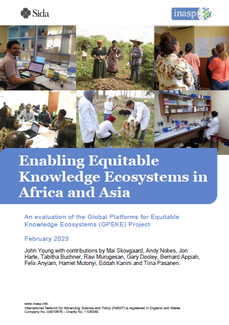
Enabling Equitable Knowledge Ecosystems in Africa and Asia
Download publication files
GPEKE builds on INASP’s existing global learning platform (AuthorAID) and works with established country partners in Uganda and Ethiopia to “enable the production and communication of quality, credible and relevant research by a more diverse range of individuals and institutions across Southern research systems”. The project is funded by the Swedish International Development Agency (Sida).
There were four high-level evaluation questions: (1) Is GPEKE addressing a real need and the right challenges? (2) Is GPEKE delivering the expected results in the way that was expected? (3) Was GPEKE implemented as planned? (4) What has GPEKE learned that might be useful more widely?
The approach used was a participatory self-evaluation involving all project stakeholders. An evaluation expert was commissioned to provide independent quality assurance and advice to the evaluation team throughout the process.
The report provides an assessment of the project’s achievements, and co-produced lessons and recommendations for a range of different stakeholders including INASP itself, AuthorAID stewards and users, INASPs partners in Uganda and Ethiopia, and other donors and agencies seeking to improve knowledge ecosystems in the Global South.
The overall conclusion is that through a combination of online learning, for researchers and support to in-country organisations supporting research production and use, it is possible to contribute to improved individual and institutional capacity and increased research productivity. But to achieve that it is necessary to:
- address inequities in research ecosystems at global, national, institutional, and individual levels,
- to stimulate and support system-level dialogue and specific initiatives and policies to promote, gender equity in research,
- ensure online support is based on the principles of effective digital learning design, is accessible to all and is well-connected to local knowledge ecosystem stakeholders,
- ensure that both women are men are able to participate and that activities meet the needs of women and men from different geographical locations,
- ensure online platforms are sufficiently resourced and managed locally so they are accessible to less well-resourced researchers,
- use the evidence to ensure donors and operational agencies are persuaded of the value of and continue to invest in research
